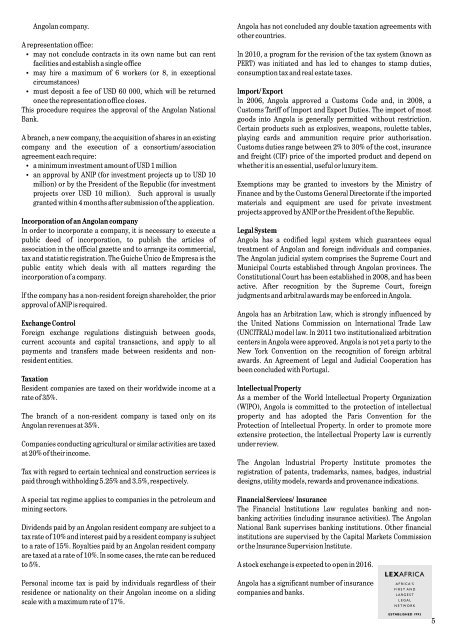LEX Africa's 'Guide to Doing Business'
LEX Africa's 'Guide to Doing Business'
LEX Africa's 'Guide to Doing Business'
You also want an ePaper? Increase the reach of your titles
YUMPU automatically turns print PDFs into web optimized ePapers that Google loves.
Angolan company.<br />
A representation office:<br />
may not conclude contracts in its own name but can rent<br />
facilities and establish a single office<br />
may hire a maximum of 6 workers (or 8, in exceptional<br />
circumstances)<br />
must deposit a fee of USD 60 000, which will be returned<br />
once the representation office closes.<br />
This procedure requires the approval of the Angolan National<br />
Bank.<br />
A branch, a new company, the acquisition of shares in an existing<br />
company and the execution of a consortium/association<br />
agreement each require:<br />
a minimum investment amount of USD 1 million<br />
an approval by ANIP (for investment projects up <strong>to</strong> USD 10<br />
million) or by the President of the Republic (for investment<br />
projects over USD 10 million). Such approval is usually<br />
granted within 4 months after submission of the application.<br />
Incorporation of an Angolan company<br />
In order <strong>to</strong> incorporate a company, it is necessary <strong>to</strong> execute a<br />
public deed of incorporation, <strong>to</strong> publish the articles of<br />
association in the official gazette and <strong>to</strong> arrange its commercial,<br />
tax and statistic registration. The Guiche Único de Empresa is the<br />
public entity which deals with all matters regarding the<br />
incorporation of a company.<br />
If the company has a non-resident foreign shareholder, the prior<br />
approval of ANIP is required.<br />
Exchange Control<br />
Foreign exchange regulations distinguish between goods,<br />
current accounts and capital transactions, and apply <strong>to</strong> all<br />
payments and transfers made between residents and nonresident<br />
entities.<br />
Taxation<br />
Resident companies are taxed on their worldwide income at a<br />
rate of 35%.<br />
The branch of a non-resident company is taxed only on its<br />
Angolan revenues at 35%.<br />
Companies conducting agricultural or similar activities are taxed<br />
at 20% of their income.<br />
Tax with regard <strong>to</strong> certain technical and construction services is<br />
paid through withholding 5.25% and 3.5%, respectively.<br />
A special tax regime applies <strong>to</strong> companies in the petroleum and<br />
mining sec<strong>to</strong>rs.<br />
Dividends paid by an Angolan resident company are subject <strong>to</strong> a<br />
tax rate of 10% and interest paid by a resident company is subject<br />
<strong>to</strong> a rate of 15%. Royalties paid by an Angolan resident company<br />
are taxed at a rate of 10%. In some cases, the rate can be reduced<br />
<strong>to</strong> 5%.<br />
Personal income tax is paid by individuals regardless of their<br />
residence or nationality on their Angolan income on a sliding<br />
scale with a maximum rate of 17%.<br />
Angola has not concluded any double taxation agreements with<br />
other countries.<br />
In 2010, a program for the revision of the tax system (known as<br />
PERT) was initiated and has led <strong>to</strong> changes <strong>to</strong> stamp duties,<br />
consumption tax and real estate taxes.<br />
Import/Export<br />
In 2006, Angola approved a Cus<strong>to</strong>ms Code and, in 2008, a<br />
Cus<strong>to</strong>ms Tariff of Import and Export Duties. The import of most<br />
goods in<strong>to</strong> Angola is generally permitted without restriction.<br />
Certain products such as explosives, weapons, roulette tables,<br />
playing cards and ammunition require prior authorisation.<br />
Cus<strong>to</strong>ms duties range between 2% <strong>to</strong> 30% of the cost, insurance<br />
and freight (CIF) price of the imported product and depend on<br />
whether it is an essential, useful or luxury item.<br />
Exemptions may be granted <strong>to</strong> inves<strong>to</strong>rs by the Ministry of<br />
Finance and by the Cus<strong>to</strong>ms General Direc<strong>to</strong>rate if the imported<br />
materials and equipment are used for private investment<br />
projects approved by ANIP or the President of the Republic.<br />
Legal System<br />
Angola has a codified legal system which guarantees equal<br />
treatment of Angolan and foreign individuals and companies.<br />
The Angolan judicial system comprises the Supreme Court and<br />
Municipal Courts established through Angolan provinces. The<br />
Constitutional Court has been established in 2008, and has been<br />
active. After recognition by the Supreme Court, foreign<br />
judgments and arbitral awards may be enforced in Angola.<br />
Angola has an Arbitration Law, which is strongly influenced by<br />
the United Nations Commission on International Trade Law<br />
(UNCITRAL) model law. In 2011 two institutionalized arbitration<br />
centers in Angola were approved. Angola is not yet a party <strong>to</strong> the<br />
New York Convention on the recognition of foreign arbitral<br />
awards. An Agreement of Legal and Judicial Cooperation has<br />
been concluded with Portugal.<br />
Intellectual Property<br />
As a member of the World Intellectual Property Organization<br />
(WIPO), Angola is committed <strong>to</strong> the protection of intellectual<br />
property and has adopted the Paris Convention for the<br />
Protection of Intellectual Property. In order <strong>to</strong> promote more<br />
extensive protection, the Intellectual Property Law is currently<br />
under review.<br />
The Angolan Industrial Property Institute promotes the<br />
registration of patents, trademarks, names, badges, industrial<br />
designs, utility models, rewards and provenance indications.<br />
Financial Services/ Insurance<br />
The Financial Institutions Law regulates banking and nonbanking<br />
activities (including insurance activities). The Angolan<br />
National Bank supervises banking institutions. Other financial<br />
institutions are supervised by the Capital Markets Commission<br />
or the Insurance Supervision Institute.<br />
A s<strong>to</strong>ck exchange is expected <strong>to</strong> open in 2016.<br />
Angola has a significant number of insurance<br />
companies and banks.<br />
5


